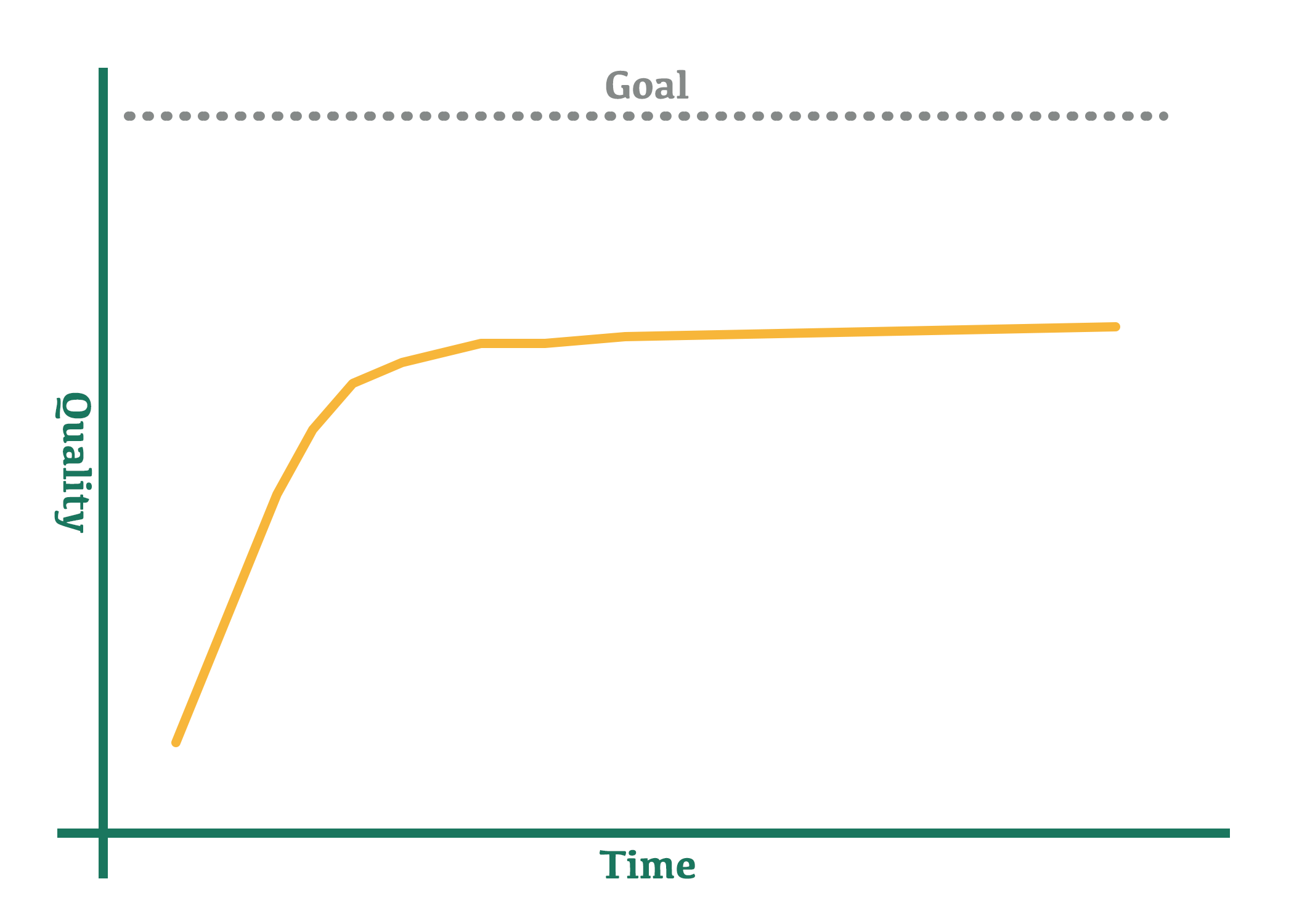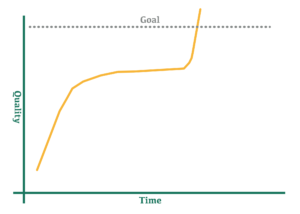Good Writers Aren’t Born, They’re Made


90% of an author’s quality stems from skills they’ve learned, practiced, and perfected. (Only 10% is natural talent.)
So if you feel like the quality of your writing over time looks like this:
…It’s probably because you’re trying to learn from the wrong resources at the wrong times.
Here are the two mistakes I see writers make:
- Jumping into advanced (usually expensive programs) they aren’t ready for and wasting money and time
- Continuing to enroll in lower-cost, more general programs that won’t take them to the next level and getting frustrated when they don’t see measurable progress
Honing your craft will require an investment of your time and, often, money. You should make sure you’re investing in the right resources at the right times.
The BEST thing you can do is to assess (honestly) where your skills are relative to where you need them to be and figure out what type of resource will get you to the next level.
Here’s a breakdown of 5 resources and when they’ll be most useful to you.
1. Books
Books are a great way to begin your writing journey. I recommend buying physical copies of a few books about writing to keep handy for quick reference. Read through these books a few times taking notes.
Should you expect these books to turn you into the next Stephen King or Margaret Atwood overnight?
Of course not.
But they will give you a solid foundation to build on and increase your confidence. In the future, when you go to work with instructors, mentors, or a critique group, you won’t feel like a fish out of water.
Pros and Cons
- Pros: Low or No Cost
- Cons: No way to check your understanding or ask questions
Best For
Beginners
Quality Hack
The first skill good writers need to develop is learning to be a good reader.
Once you’ve studied your books about writing, begin reverse engineering all the books you read and enjoy. How are they structured? What makes the protagonist sympathetic? Why is the writing pleasurable to read?
Looking for the things you’ve learned about in published books will improve your own writing.
Recommendations
- How to Fix Your Novel by Steve Alcorn
- Plot & Structure by James Scott Bell
- Scene & Structure by Jack Bickham
2. Writing Courses
Writing courses offer a more structured and, often, more interactive way to learn. These days you can find thousands, if not tens of thousands, of online writing courses. It can be difficult to separate the wheat from the chaff, but generally expect to get what you pay for.
A free course is likely going to be light on content and offer no interaction with the instructor. This might be fine if you are a beginning writer working to learn the basics, but don’t expect free courses to improve your skills beyond the baseline.
Low cost courses (~$50-$99) will either offer more robust content but little or limited interaction with the instructor or be about a highly specific topic that can be thoroughly covered in a couple of hours.
Courses in the intermediate price range (up to a few hundred dollars) should offer lots of content and some interaction with the instructor (at least the ability to ask questions, preferability some feedback on your work).
Hands-on, interactive, courses should offer a lot of one-on-one feedback from an instructor. Depending on the course, duration, and end product, you should expect to pay between a few hundred and a few thousand dollars. A one-day workshop should cost less than a six-month-long mentorship.
Basically, the more interaction and feedback you get from your instructor, the more you should expect to pay. Also, the more interactive the course and the more feedback you get on your own writing, the faster the quality of your writing will improve.

Things to consider when deciding on a course are:
- Who’s teaching it
- Whether it covers a general (better for beginners) or specific (better for intermediate) topic
- How long you have access to the material/instructor
- Whether you’ll be creating one polished end product or learning general skills
Pros and Cons
- Pros: Wide variety of subjects and price points
- Cons: Must thoroughly research and vet the course/instructor
Best For
Beginners and Intermediate
Quality Hack
Participate!
Nothing makes me sadder than having a student in a class who never posts an assignment or question. If you’re going to invest, make the most of it!
Remember, the most valuable part of a course is the instructor’s time and attention.
Recommendations
Beginning Writers
Intermediate Writers
- Genre-Specific Workshops (Romance, Mystery, Sci-Fi/Fantasy, etc.)
Intermediate/Advanced Writers
3. Other Courses
It takes more than just writing skills to be a successful author. Whether you choose to pursue traditional or self-publishing you’ll need a firm grasp of the publishing and marketing worlds.
Really, it’s never too early to learn these skills. Understanding what makes a book marketable BEFORE you write it can save you time and heartache later on. But it’s also never too late to learn.
Pros and Cons
- Pros: Round out your skills, shorten the path to success
- Cons: Must thoroughly research and vet the course/instructor
Best For
All levels
Quality Hack
These courses likely won’t impact the quality of your writing directly, but they will improve the quality of your career.
Recommendations
- The Recipe for Going Pro by Writer’s Secret Sauce
- Publish Your Book Now
Other Skills to Consider
- Basic Social Media proficiency
- Maintaining an author website
- Email marketing
- Public speaking
- Basic graphic design
4. Writing Conferences
There are hundreds of Writing and Publishing Conferences each year. The array of speakers and opportunities is often dazzling. Some also offer unique experiences to workshop material with authors you admire, practice pitching projects to agents and editors, and more.
The secret to success is being clear about why you’re going and ensuring the conference offerings meet your current needs.
For example, if you’re looking to master general craft skills, you’ll be better off taking a writing course than attending a conference. However, if you’re looking to acquire a specific skill that’s featured in a panel, discussion, or workshop, a conference might be a good bet.
Of the available resources, I would say this is the most optional.
Pros and Cons
- Pros: Networking
- Cons: Expensive, may require travel
Best For
Intermediate and Advanced Authors who are ready to:
- Network with agents and editors to seek representation
- Launch self-published careers
If you are a beginning author and have the opportunity to go to a smaller, regional writing conference in your area, it can be a great opportunity to network with peers and find or form a critique group. Just be sure to do the cost/benefit analysis.
Recommendations
What conference is right for you when really depends on who you are, where you are, and what your current skill level is.
5. Professional Editing
Having your work professionally edited is the dream for most authors. You get holistic feedback about your work and the quality of your manuscript goes WAY up.
The biggest downside is it’s expensive (usually you pay by the word).
There are two things to consider when it comes to assessing the return on your investment for editing services.
- You get a better end product.
- You learn and become a better writer by going through the process.
For a self-published author, editing is non-negotiable to ensure the quality of the finished product is professional.
An author looking to secure representation and publish traditionally may still benefit from some types of editing, though the learning component is more important than the end product.
You can learn about the different types of editing here.
Pros and Cons
- Pros: Personalized feedback that both improves the quality of your product and allows you to learn fast
- Cons: Expensive
Best For
If money were no object, there would never be a bad time to work one-on-one with an editor.
However, editing is expensive. Realistically, it is best for intermediate and advanced writers looking to tip a manuscript over the line from “draft” to “publishable.”
Quality Hack
- Ask for sample edits from an editor to ensure their style is a good fit for you.
- Don’t argue with an editor. You don’t have to make every change they suggest and it’s even fine if you disagree with some of their feedback, but it is more productive to dig into the root of what made them give that feedback to see if there’s something deeper that needs to be addressed.
- Don’t dive straight into polishing your first draft. There is a big difference between “polish” and “rewrite.” And, as the saying goes, “Good writing is re-writing.”
Recommendations
I offer various editing and publishing assistance services through Writing Academy.
However, I strongly encourage all my clients to get sample edits and quotes from a few editors. Finding an editor who clicks with you is important!
If you’re wondering whether someone is over- or under-pricing their services, you can consult the Editorial Freelancers Association’s rates table.
There is a lot of rate variability depending on the specific needs of a manuscript, so don’t be surprised if you see someone quoting a rate slightly outside the median range you see listed. But if you see someone quoting a rate drastically outside the range, approach with caution.